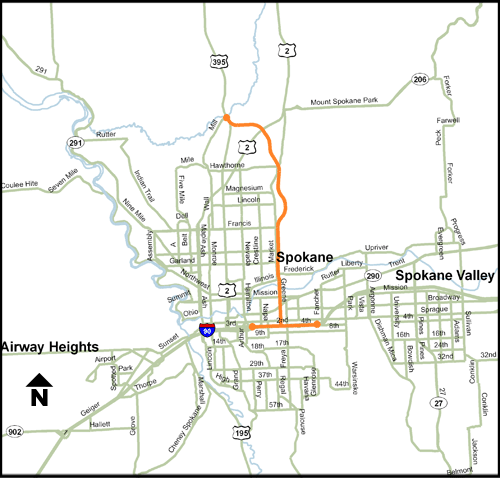Former Washington State Representative Margaret Hurley, aided by Margaret Leonard at the local level, saved the Logan neighborhood in Spokane from a freeway plan that would have razed 600 homes. Now the plan is reborn in another part of town.

In a two-part feature, Nicholas Deshais reports on an under-appreciated chapter of Spokane, Washington's history: the time the city's female representation in the state and local governments stopped the construction of a north-south freeway through the city.
The main subject of the articles is Margaret Hurley. "Though her name has faded from Spokane’s collective memory since she left elective politics in 1984, her effort is clearly on display on the east side of town."
"That’s because the freeway would’ve been built in the 1970s, but Hurley almost single-handedly stopped it," adds Deshais. "Hurley said she opposed the north-south freeway from the beginning because it was proposed to go up the Nevada-Hamilton corridor, blazing a route through the densely populated Logan neighborhood near Gonzaga University."
Among her legislative accomplishments, according to the second article in the series, Hurley "pushed through her law requiring an environmental review of every state highway project."
The law, and Hurley's opposition, saved the original 600 homes in the Logan neighborhood, but the state is again moving forward with the freeway plan, now called the North Spokane Corridor. The freeway is scheduled for completion in 2029, at the cost of $1.5 billion. According to Deshais, "the current route will raze 500 homes and 115 businesses when all’s said and done," by cutting through the neighborhoods of East-Central, Chief Garry and Hillyard.

FULL STORY: Getting There: The woman who fought freeways

Planetizen Federal Action Tracker
A weekly monitor of how Trump’s orders and actions are impacting planners and planning in America.

Chicago’s Ghost Rails
Just beneath the surface of the modern city lie the remnants of its expansive early 20th-century streetcar system.

Amtrak Cutting Jobs, Funding to High-Speed Rail
The agency plans to cut 10 percent of its workforce and has confirmed it will not fund new high-speed rail projects.

Ohio Forces Data Centers to Prepay for Power
Utilities are calling on states to hold data center operators responsible for new energy demands to prevent leaving consumers on the hook for their bills.

MARTA CEO Steps Down Amid Citizenship Concerns
MARTA’s board announced Thursday that its chief, who is from Canada, is resigning due to questions about his immigration status.

Silicon Valley ‘Bike Superhighway’ Awarded $14M State Grant
A Caltrans grant brings the 10-mile Central Bikeway project connecting Santa Clara and East San Jose closer to fruition.
Urban Design for Planners 1: Software Tools
This six-course series explores essential urban design concepts using open source software and equips planners with the tools they need to participate fully in the urban design process.
Planning for Universal Design
Learn the tools for implementing Universal Design in planning regulations.
Caltrans
City of Fort Worth
Mpact (founded as Rail~Volution)
City of Camden Redevelopment Agency
City of Astoria
City of Portland
City of Laramie





























